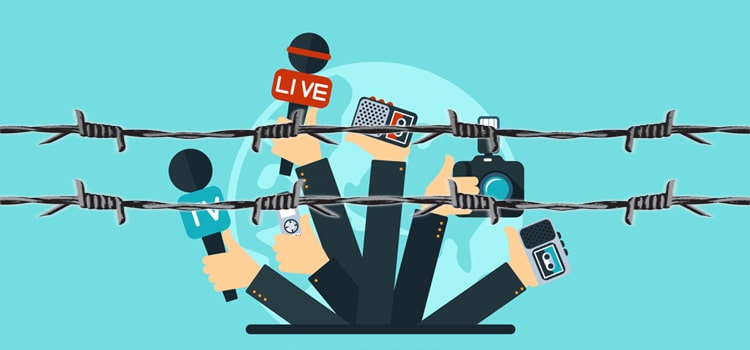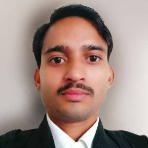INTERFACE BETWEEN MEDIA TRIAL AND FREEDOM OF PRESS ACROSS DIFFERENT TIMES
Posted On : July 22, 2021

Table of Contents
To genuinely infer the guilty and innocent, good administration of justice necessitates a thorough comprehension of the issue. The procedure, however difficult, takes time, and it is critical to respect the time spent gathering adequate evidence to ensure that no innocent people are punished. As a result, public faith in the judicial system is critical in the long run. This can be significantly impeded if the media leaps to early conclusions of its own, therefore jeopardising the entire legal procedure.
There are a number of scholars and thinkers who had penned down their thoughts with regards to the concept of media trial. Jyoti Punwani in the article “Denial of Constitutional Rights”[i] mentioned two very important points regarding media trial, firstly that it is difficult for the people who are not accustomed to media attention to face constant media coverage and conjectures over their cases, which always has a possibility to scar them for life. Secondly, the media seems to accept the police version of the case which is most of the time biased and one directional and not the opinion of the skilled judges, this creates a bias in the minds of the people and the society therefore scarring the image of a person. The author mentions the fact that the criticism which is faced by the celebrities are not so grave because they are accustomed to media attention. However, this is correct to the extent that the media is in support of the celebrity. Media determines the outlook of a person which can be clearly defiled when the media criticises and hurls unnecessary abuses on the people in a criminal charge. Mohammad Waseem[ii] rightfully mentions the fact that media trial increases people’s dissatisfaction in the established institutions of a country. Sometimes media trial is heralded by the whims of the politicians and people with the agenda of creating dissatisfaction of the public in the eyes of the people. Sudhanshu Ranjan[iii] encapsulates the interface between media and judiciary where he implies that to ensure that is free and fare judiciary it has to stay away from sensitised news of the media.
The position over the concept of media trial has resurfaced in India in the recent times with the happening position of poor Rhea Chakraborty after the alleged death by suicide of her beau and Bollywood heartthrob Sushant Singh Rajput. PIL (St) No. 922252 of 2020 has been filed raising concerns about the media coverage pertaining to the unnatural death of actor Sushat Singh Rajput, which according to the Petitioners may tantamount to media trial.[iv]The fuss over the fact that the girl is responsible for the death of the actor has increased to such an extent that any information to the contrary is being considered to be false. Recently Central Bureau of Investigation(CBI) to whom the die-hard fans of the actor were so profoundly leaning onto for the fact that they would exhume the truth by telling the world, that solely a girl is responsible for the fate of the actor, were devastated when they found out that it was not a murder of any sort. It is understandable that in a Pandemic situation the lives of the people have become monotonous and to add onto that the Indian daily soaps have been repeating the same rhetoric since the imposition of lockdown, folks want some entertainment and such real-life tragedies affect people in greater magnitude than anything else. However, what is not understandable is the audacity of the population and the media alike to consider the fact that they are capable of insinuating and inferring a decision affecting the life of a person. Here despite the incessant initiatives of the people to recognise the importance of the
MEANING AND SCOPE OF MEDIA TRIAL
Dr. B. R. Ambedkar once said:
"The press (or the mass media) has no special right which are not to be given to or which are not to be exercised by the citizen in his individual capacity. The editor of a Press or the manager are all citizens and, therefore, when they choose to represent any newspapers, they are merely exercising their right of expression and in my judgement no special mention is necessary of the freedom of Press at all."
Apart from the three institutions of government, the media is the fourth, and the role of media and journalism is regarded as crucial, particularly in a democracy. The media's influence and importance in democratic societies is well known across the world. Despite the fact that the media and the press have a persuasive authority, the world is aware of their true capabilities. The existence of a free, independent, and strong media is the bedrock of democracy, particularly in a nation as diverse as India.
The media's power to mobilise the thought processes of millions is crucial. A democracy is technically made up of three pillars: the judiciary, the executive, and the legislative. However, with the advent of the press and its ability to reach every corner of the country, it may now be called the fourth pillar of a democracy.
JUDICIAL INTERPRETATION OF MEDIA TRIAL
The influence of television and newspaper coverage on a person's reputation by generating a public sense of guilt, regardless of any court of law decision, is referred to as "trial by media." [v] Trial by media and public agitation being the very antithesis of rule of law should be ignored by the trial judged in finding the accused guilty and in awarding the sentence. [vi]
There are a number of guidelines that has been set up regarding the concept of media trials by the Indian Judiciary. When dealing with important cases, the media is expected to follow certain guidelines, including: 1. playing a positive role in informing the general public about what happens during the hearing, and 2. refraining from publishing the same in a way that generates unnecessary publicity for their own paper or news channel. [vii]
In order to increase their viewership, TV and channel producers create scenarios in which public officials are enticed by financial incentives to conduct themselves in a corrupt or non-beneficial manner. This is termed inappropriate behaviour. [viii] Therefore, false allegations in media against officials concerned is liable to be prosecuted for defamation under IPC[ix].
The media trial is also seen as a breach of the separation of powers concept. If things are allowed to be settled via unethical methods and the institution is tarnished by any means, the system's basic independence will be jeopardised, and matters cannot be determined through a media trial. [x]
LEGAL PROVISIONS- MEDIA TRIAL
The Indian Constitution's Article 19(1)(a) protects freedom of speech and expression, although Article 19(2) allows for reasonable limits to be imposed by legislation for a variety of reasons, including "contempt of court." Although ‘administration of justice' is not mentioned in Art.19(2), interfering with the administration of justice is explicitly mentioned in the concept of ‘criminal contempt.'[xi] At present, under sec. 3(2) of the Contempt of Courts Act, 1971 read with the Explanation below it, full immunity is granted to publications even if they prejudicially interfere with the course of justice in a criminal case, if by the date of publication, a charge sheet or challan is not filed or if summons or warrant are not issued.
The Law Commission in its 200th report, Trial by Media: Free Speech versus Fair Trial Under Criminal Procedure (Amendments to the Contempt of Courts Act, 1971), has recommended a law to debar the media from reporting anything prejudicial to the rights of the accused in criminal cases, from the time of arrest to investigation and trial.
The commission has said, “Today there is feeling that in view of the extensive use of the television and cable services, the whole pattern of publication of news has changed and several such publications are likely to have a prejudicial impact on the suspects, accused, witnesses and even judges and in general on the administration of justice“.
This is criminal contempt of court, according to the commission; if the provisions of the Act impose reasonable restrictions on freedom of speech, such restrictions would be valid.
It has suggested an amendment to of the Contempt of Courts Act.[xii]
The right to freedom of speech and expression is protected under Article 19 of the Indian Constitution. During high-profile court cases, the media is frequently accused of inciting public hysteria akin to a lynch mob, which not only makes a fair trial nearly impossible, but also means that, regardless of the outcome of the trial, the accused is already presumed guilty and would be unable to live their lives without the constant scrutiny of the public. [xiii]
The media should work to guarantee that there is a distinction between media trial and media that is instructive. As a result, there should be limitations on the media, as well as a duty and caution on the side of the media to adhere to the provisions of the Freedom of Speech and Expression Act. Article 19(1)(1) and (2) (2). [xiv]
There are number of high end cases like the Santosh Kumar Singh vs. State[xv] regarding the murder of Priyadarshini matoo and the Jessica Lal case[xvi] as well as the Arushi Talwar case which give us the importance of the fact that media trial can hamper the image and thereby create problems with the proper administration of justice.
[i] Jyoti Punwani. “Denial of Constitutional Rights.” Economic and Political Weekly, vol. 41, no. 36, 2006, pp. 3841–3843. JSTOR, www.jstor.org/stable/4418668.
[ii] WASEEM, MOHAMMAD. “Clash of Institutions in Pakistan.” Economic and Political Weekly, vol. 47, no. 28, 2012, pp. 16–18. JSTOR, www.jstor.org/stable/23251707.
[iii] “MEDIA AND JUDICIARY: REVITALIZATION OF DEMOCRACY.” Journal of the Indian Law Institute, vol. 57, no. 3, 2015, pp. 415–436. JSTOR, www.jstor.org/stable/44782789.
[iv] Nilesh Navlakha V. Ministry of Information and Broadcasting, 2020 SCC OnLine Bom 895.
[v] R.K Anand V. Delhi High Court, (2009) 8 SCC 106.
[vi] State of Maharashtra v. Rajendra Jawanmal Gandhi, (1997) 8 SCC 386;
[vii] S. Khusboo V. Kanniammal, (2010) 5 SCC 600.
[viii] Raj Ram Pal v. Lok Sabha, (2007) 3 SCC 184.
[ix] Rajdeep Sardesai v. State of A.P, (2015) 8 SCC 239.
[x] R. Muthukrishnan v. High Court of Madras, (2019) 16 SCC 407.
[xi] sec. 2 of the Contempt of Courts Act, 1971
[xii] Section 3(2), The Contempts of Court Act,1971.
[xiii] R.K Anand V. Delhi High Court, (2009) 8 SCC 106.
[xiv] Nipun Saxena v. Union of India, (2019) 2 SCC 703.
[xv] Santosh Kumar Singh vs. State through CBI- (2010) 9 SCC 747
[xvi] Manu Sharma v. State (NCT of Delhi), (2010) 6 SCC 1























